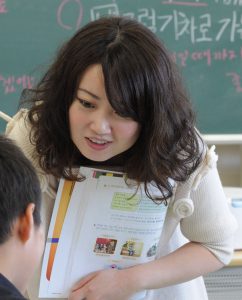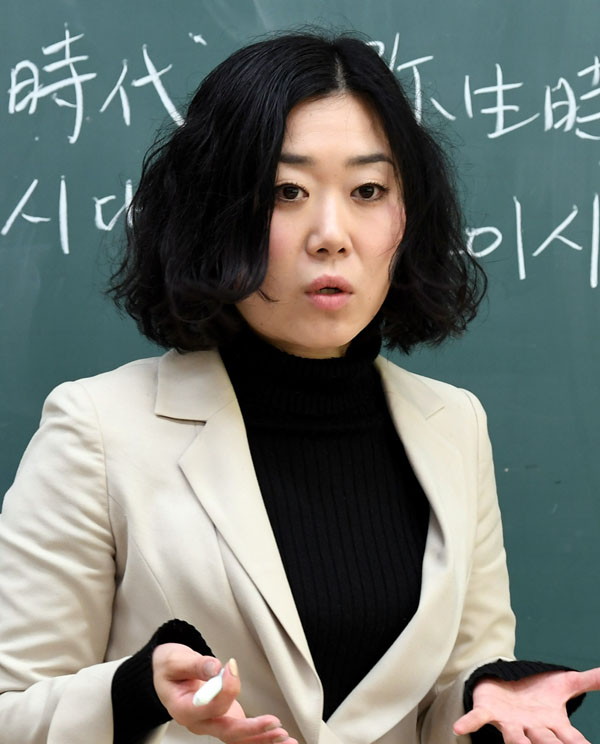心の内面に働きかけるコリア語教育

コリア語 金泯芝(キム・ミンジ)教頭先生
日本や韓国でいう言語教育というと、きちんと文法を理解し読解すること、文法ミスなく文章を作成することを到達点としているイメージがあります。もちろん、こういった教育法を否定しているわけではありません。実際、ペーパー試験での高得点という目に見える実績が生徒たちや保護者の安心に繋がっています。しかし、その裏面に活用度の低さが存在するのは、誰もが見て見ぬふりをしてきた部分でしょう。
一言でいうと、KISでの「コリア語」の到達点は、多様な場面で活用できるコリア語、「韓国語能力試験」といういわゆるペーパー試験で高得点に繋がるコリア語、この二つのバランスを取りながら、言語を通して心の内面に迫ることだと言えます。
第二言語であるコリア語をどのように学習すれば、第一言語のように話し、書くことが可能となってくるのでしょうか。その秘訣は、まず、勉強として学習しないことです。ここでいう勉強とは、ペーパー試験で高得点を取るための勉強です。つまり、言語学習におけるペーパー試験は自分の実力をはかる手段として使うものであって、それこそが到達点となってはいけません。そのために、私たち教員がやるべきことは、コリア語のスキルを上げるための教育法を研究するとともに、生徒にそのスキルを発揮できる場を作ることだと思います。間違ってもいい、表現することを怖がってはいけない、まずは口に出して表現してみましょう。必ず、上達します。
KISだけの社会科授業へようこそ!

社会 金明佳(キム・ミョンガ)先生
「社会科」と聞いて、みなさんはどのようなイメージを持ちますか。私が社会科教員として一番心がけていることは、社会科の科目が嫌い、苦手だという生徒のために、少しでも授業を面白く、印象に残し、試験では点数に反映されなかったとしても、「生きるための知恵」として生徒の頭脳、体内に残すことです。そのために、ただ事象を羅列し、覚えることを強要せず、なぜそうなったのか、理由や原因を考える時間を授業中に多く取っています。
KISの社会科の魅力はこれだけではありません。多くの在日コリアンの知識人が尽力しKISが建学されたように、日本社会では形成し辛い自らのアイデンティティーを自由に考え、学ぶことができます。私自身も在日コリアン3世として生まれ、日本の教育を受けて育ちましたが、その過程で、自らのアイデンティティーについて深く悩みました。KISは在日コリアンだけではなく、多様な文化的背景をもつ生徒、先生が一緒に学び、「互いの違いを認め合う」という素晴らしい文化が根付いています。
生徒にとって言語や理数科などの他の教科も勿論大切ですが、KISにおいて社会科が担う責任は大きいと認識しています。なぜならば生徒が持つ歴史観や人生観、生徒の人格に直接影響するからです。KISで学ぶ生徒には、KISの建学の精神や教育理念をきちんと理解し、身に着け、平和な社会を追求する人間になってもらいたいです。そのために私たち教員は努力し続けます。
Replacing Fear with Joy

英語 Ramaswamy Sandesh Rajanna 先生
Most people around the world, no matter their age or nationality, has heard or read some English in their lives. English is the most common language used throughout the world in business and recreation. However, many students can understand some English, but they don’t speak it. Why is this? Fear. English classes often punish students for making even small mistakes. Students also know what English should sound like – maybe they love watching English movies but they have trouble in conversation. It is strange that this attitude is common when learning a language. After all, no one starts perfect.
Imagine 2 situations. The first situation: a student starts playing baseball and makes mistakes. The student’s coaches and classmates yell and compare them to Shohei Otani. The student has seen Shohei Otani and feels ashamed that he isn’t as good as Otani.
The second situation: a student starts playing baseball and makes mistakes. The coaches and classmates instead encourage the student and congratulate them on trying their best. The student has seen Shohei Otani but doesn’t feel ashamed that he isn’t as good as Otani.
Which situation sounds better for the student to learn baseball in? At KIS, the English department strives for lessons like the second situation. Learning a language should be like a hobby that everyone can enjoy and improve at, no matter their skill level. Mistakes aren’t harshly punished, but are used to teach. By doing so, students can learn from their mistakes and eliminate their fear.
When students have no fear, they begin to find joy in using English. Hobbies that continue into adulthood are those which people enjoy. Likewise, if a student starts to enjoy English, they set themselves up for success and lifelong learning that will continue into adulthood as they join an increasingly globalized society.

